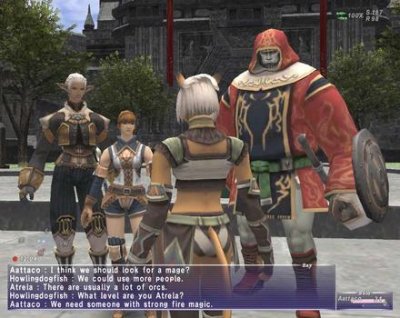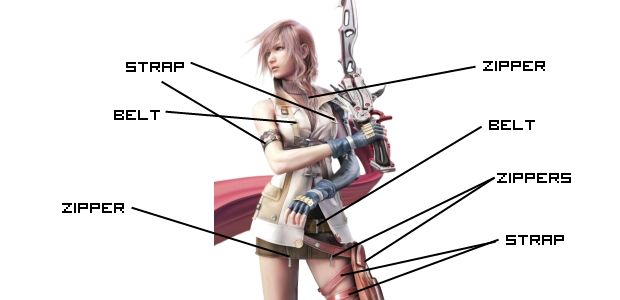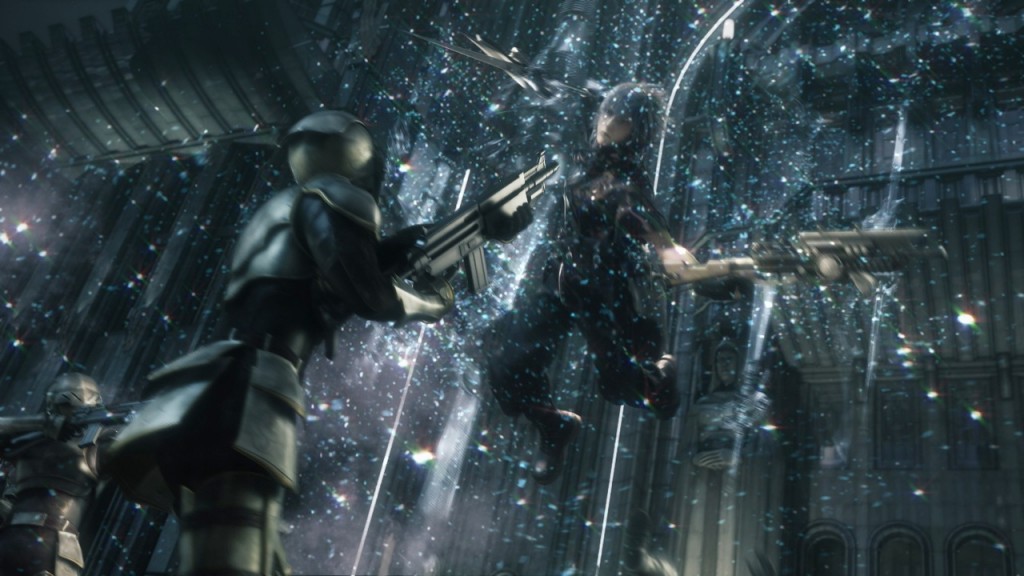Last updated on March 4, 2013
Continuing E3 coverage! Kidding. I’m just looking for hits! Anyway…
I’ve always found Final Fantasy XI to be a bit of an odd game. I had played World of Warcraft before I had ever touched it. Knowing the pedigree of the series, I figured that its system would, at the very least, eclipse WoW in terms of mechanics, ease of use, and everything else Japanese developers are known to implement well.
What I got was a great soundtrack and little else. The game was fun in 2005-6, I admit, purely because I had some friends who already played it. Still, the whole “get a world pass to play on the same server” idea always struck me as awkward. Plus, the game just throws you into the fray almost immediately, and starts the grindfest. You find, quickly, that pretty much everything had to be done in groups, and that group play mostly consisted of more grinding. WoW does contain grinding, but they dress it up in interesting and fun ways; FFXI did not.

I know, of course, that the game got better and better as time went on until the recent patches have all but turned the game into WoW and made everything convenient. That’s not to say I don’t appreciate the conviction and passion required to play it (10 hour boss battle!), but it just wasn’t my cup of tea.
Now, you’d imagine that Square-Enix would just take World of Warcraft, smack lots of Final Fantasy paint on the canvas, and voila! – modern MMO with Final Fantasy trappings! Even if it was a total ripoff, you’d still have that Final Fantasy flair, and you would know that they learned from their mistakes, which were fine ten years ago, but post-MMO explosion could never, ever be forgiven by any gamer with a pulse.
So it was that I waited with bated breath for Final Fantasy XIV, in hopes that I might finally abandon the plains of WoW’s wonderful world for something that surpassed it. I hoped against hope that the Japanese development team would give us all that and more. Chocobo mounts, real-time combat that wasn’t crazily complicated (skillchains!), quests, big bosses, summon magic, a great story, the works! It was all going to happen, and all in the environment of the next generation. Truly, it was going to be stupendous.
But then the reviews trickled from the major publications. The game was bad – very bad. I couldn’t believe it. How could they have messed this up? How could they destroy a mainline Final Fantasy game? It was universally acknowledged: Final Fantasy XIV sucked. Knowing its flaws, watching the Yogscast playthrough, I couldn’t bear to even play it. The dream died; there would be no Final Fantasy MMO that could surpass WoW.
But there was hope. Square-Enix admitted to their mistakes. They are starting to right the wrongs. And I am watching. From here.
1UP: It’s kind of common sense that after an MMO has a bad launch, you just give up on it and shut the servers down… It’s really just the challenge? It’s not pride? Or Square can’t imagine having the “lost Final Fantasy,” number fourteen…?
NY: Yes, there is the aspect there of, you know, “Because we can’t let a Final Fantasy fail.” But even more than that, there was the fact that, by releasing a game that didn’t live up to player expectations, we basically betrayed our player’s trust.
They expected something that was at a certain quality and we didn’t deliver on that. We felt that if we just stopped there, it would end up hurting Square Enix in the long run if we just gave up. So we decided to go back and show the players that, no, we’re really sorry that we did this, we have to show you that we are really into this project and regain the players’ trust by showing them that, yes, we’re going to give you what you expected. That’s been his policy, he’s gotten support from the president with that, and the whole company is backing this project now, because we want to get back the player’s trust.
This is good, very good. It’s a good start, but there’s a deeper problem with Square-Enix than that “we made one bad game.” They’ve made a lot of mediocre games; that’s slightly worse for the once great gaming giant.
The advent of video games came within a capitalist society. In that sense, it’s a product, and a developer creates, crafts, and molds this product into an attractive and useful shape. Sometimes, that shape (as in the past) was set in stone once it was thrown out the door to the masses; at other times (such as in our era), the product comes out unfinished, under-cooked and blatantly abusive to the players, as developers increasingly rely on further incremental improvements to hit deadlines rather than create a substantial initial product.
Especially when brand names are involved, a further element gets thrown into the mix when these two distribution methods collide. The Final Fantasy series has always been of the console game mold: the game, itself, has been tested and retested for its eventual release. Perhaps the localization of the dialogue was never quite there, or wasn’t a priority (YOU SPOONY BARD!), but the game itself never had horribly egregious bugs that could be found by a normal player.
Now, imagine taking this same business model of product development and, suddenly, thrust into the realm of Web 2.0, force the company into the position of the data patch model. A mix of these two has not been a successful methodology for Square-Enix. Instead, they’ve alienated their long-time fans without quite knowing why their own success has begun to dwindle.
Easy answer? Stop letting zipper boy make games (Tetsuya Nomura, I’m looking at you).

Hard answer? There’s a psychological element to video game branding. It’s the same phenomenon, for example, that makes a certain movie something I want to see, even if the subject matter is different. For example, if I liked Kill Bill, I probably will like Inglorious Basterds too, seeing as they are both directed by Quentin Tarantino. Movie sequels…well, usually they’re worse. Game sequels, on the other hand, tend to improve the mechanics of the first game or make drastic changes while retaining the same brand. The Final Fantasy series changes with each installment, but the expectations always remains: it must be a great game that succeeds in fulfilling its own pedigree, even if it’s completely different. Thus, Square-Enix become victims of their own success because they lack the vision to understand their audience’s emotional attachment.
Of course, placing the name “Final Fantasy” on something guarantees money, but putting it on everything lowers the quality of that brand, especially if the product isn’t up to snuff. Furthermore, if the game plays against these expectations, then the situation feels like betrayal. That’s the situation of FFXIV in a nutshell. It’s very similar to Mass Effect 3 and the controversy over its ending, which completely goes against the idea of “choice” Bioware so regularly emphasizes. Perhaps it’s an artistic choice, but it remains an inconsistent choice with all the narrative that came before because it offers three choice given to ALL players at the end. The developer makes the choice, then. What was expected with FFXIV was a great Final Fantasy game; what we got was a horrible MMO that, somehow, learned zero lessons from any of its competitors and failed to be a true Final Fantasy in any sense.

Even so, I think Final Fantasy fans will continue to cling to the series regardless. They know it can be great again, but Square-Enix just needs to put some fresh, ambituous talent at the reigns of the series. We don’t need more zippers (FFXIII Versus). But what we do need is the fans to confess their own inability to stop buying these games, then judging said games without conscious thought. We need to move beyond the brand name paradigm, or you’re going to get the same game over and over again. We need to make them earn that trust, or you’re just going to get the exact same crap over and over again. Don’t buy bad games, is what I’m saying. Self-evaluation is key. Jesus said it best in Matthew 7:
Do not judge so that you will not be judged. 2 For in the way you judge, you will be judged; and by your standard of measure, it will be measured to you. 3 Why do you look at the speck that is in your brother’s eye, but do not notice the log that is in your own eye? 4 Or how can you say to your brother, ‘Let me take the speck out of your eye,’ and behold, the log is in your own eye? 5 You hypocrite, first take the log out of your own eye, and then you will see clearly to take the speck out of your brother’s eye.
Speaking out, obviously, about the problems, both with voices and wallets, is a good start, but this goes for all game companies. Actually find out what you want to play, rather than being manipulated into “good” games. Demand games that are unique, rather than bog-tired concepts re-used over and over again (I like make fun of FFXIII, even if I enjoyed it). Don’t let David Cage turn games into a FMV sequence rather than a unique interactive medium. And don’t let mindless sequels get in the way of great, original games. It’s a two way street; you don’t get what you want if you mindlessly buy anything that comes in front of you.
What I mean to say is, buy The Last Story so you don’t have to worry about all this. Hironobu Sakaguchi wants your money! He basically made 3 Final Fantasy games (Blue Dragon, Lost Odyssey, and The Last Story), and branding got in the way. Gamers, for all their knowledge, have a problem letting go of their own nostalgia. Do some research! Play games that play well, rather than ones that fit some brand-recognition.
